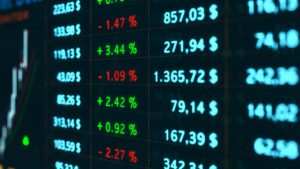Europe becomes flavour of the month as US equities hit a roadblock
For investors looking to diversify their equity portfolios in 2024, all roads led to the US. The Magnificent Seven stocks were firing on all cylinders — in particular, the ‘Magnificent One,’ Jensen Huang’s NVIDIA — and investors were only too happy to come along for the ride. And the election of a pro-business, low-taxing Donald Trump as President late last year simply reinforced this bullish sentiment.
As Tim Graf, US asset manager State Street’s European head of macro strategy, says, “the consensus was that US stocks, which make up about 60 per cent of global equity market capitalisation, would have another great year, led by further gains in tech stocks, which make up about 40 per cent of that US market capitalisation.
“But things have gone horribly wrong the past few months for tech, for US stocks and, in fact, for the performance of most of the trades that were associated with the election of Trump.”
The numbers say it all. For the year to date, the S&P 500 is down about 2.7 per cent and about 7 per cent from its February peak. Tech and Communication Services, effectively the Mag 7, is down 8.2 per cent this year and 11.2 per cent from its peak. And finally, US stocks have underperformed Europe by about 10 per cent. Graf’s blunt assessment of the US market: “We’re almost in correction territory.”
Investors that finally heeded their advisers and diversified into overseas markets can be forgiven if they are shaking their heads and thinking, somewhat ruefully, “better the Devil you know”.
But diversification is a tried and tested investment approach – research shows that a key reason SMSFs lagged APRA-regulated funds in 2022-23 was their lack of exposure to overseas markets – and venturing into offshore markets is no different to the ASX. It can be volatile. And diversification is not just a US story.
So, just as Trump ascending into the White House was meant to have the bulls running like it was Pamplona in July, so too did many analysts expect the European markets to struggle in the face of sluggish economies and an ascendant US.
Yet the converse has happened, with some European markets having a spring in their step. Marc Jocum (pictured), senior product and investment strategist at ETF issuer Global X, says factors such as lower inflation, proactive fiscal measures and better corporate earnings revisions have contributed to Europe’s performance.
“Many economists and strategists were bearish on Europe this year, but this lower starting point provides greater potential for positive surprises. While we believe the US exceptionalism narrative remains intact, the market is grappling with the impact of Trump’s rapid and large-scale policies that are fuelling concerns about a slowdown and potential recession.
“We believe Europe should have a place in client portfolios to diversify regionally and offer exposure to sectors that the US market is underweight, such as financials and industrials, while also reducing reliance on mega-cap tech stocks.”
Jocum says preferred sectors in Europe such as defence and financials have been strong performers.
“European defence stocks have benefited from the proposed substantial investment from government, marking a shift from its traditional fiscal conservatism. Additionally, the (European Commission’s) EC’s proposals for enhanced defence spending and incentives for manufacturing have contributed to a more optimistic growth outlook for defence stocks across the continent.
“Finally, European financials have outperformed their US counterparts, reflecting robust returns on equity, attractive valuations and potential M&A opportunity. Spanish banks, for example, are trading at about a third of the price of Australian banks, despite demonstrating solid profitability metrics – an opportunity for investors looking to diversify their exposure to the banking sector.
“So, while investors may have been fixated on Trump’s MAGA (Make America Great Again), the idea of MEGA (Make Europe Great Again) could be gaining traction.”
But Jocum warns investors not to ignore US equities, a sentiment shared by Cayla Seder, a senior strategist from State Street’s US team. She argues investor concerns about the Mag 7’s profitability are “a bit overblown”, while noting that the differences in valuations across industry sectors is much smaller than it was in the dot.com bubble of the early 2000s.
“Tech might feel expensive, but everything else is still expensive. There aren’t many other great choices,” says Seder.











